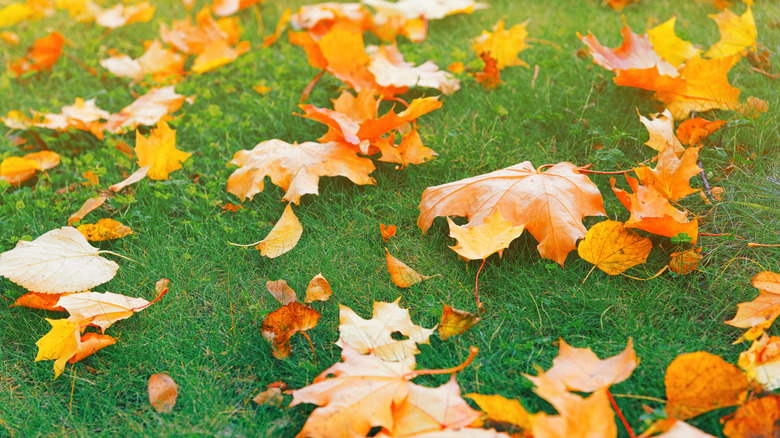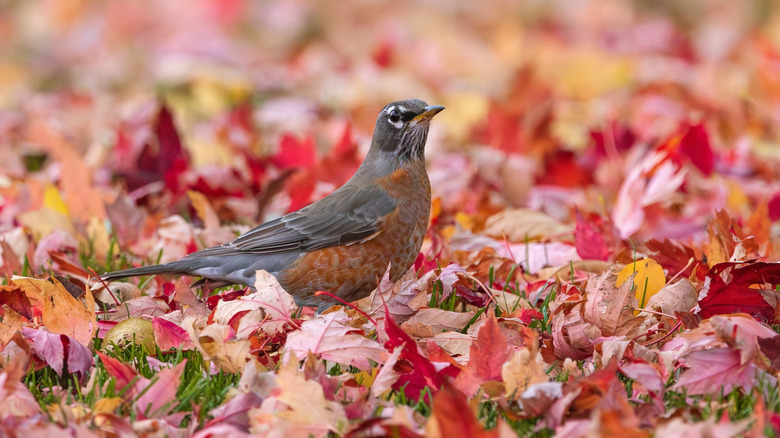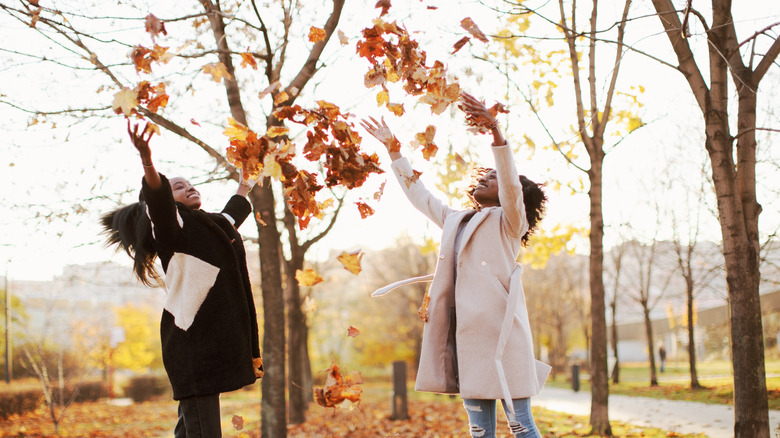Why You Shouldn't Rake All The Fallen Leaves In Your Yard This Fall
As falling autumn leaves start blanketing the yard, you might not want to be so quick to reach for that rake. In fact, maybe you should let those leaves stay exactly where they are. Refraining from bagging and disposing of leaves may benefit your lawn and wildlife.
The "Leave the Leaves" movement has gained traction in recent years. The concept is simple: Rather than rake, bag, and discard fallen leaves, let most of them decompose in your yard, as nature intended, so that they add back nutrients to the soil and give insects and animals shelter in the colder months. By some estimates, leaves and other lawn refuse account for about 10.5 million tons of solid waste a year in the U.S, much of which ends up our landfills.
To help cut down on all that waste, the National Wildlife Federation has named October "Leave the Leaves" month. You can even sign a Leave the Leaves Pledge, vowing to let leaves fall where they may and stay there. This will get you one step closer to earning a Certified Wildlife Habitat recognition for your yard. Long before we domesticated the land, built our homes, and planted grass, trees shed leaves every fall with no one to rake and bag them, and things worked out just fine. Better than fine, actually, because decomposing leaves offer all kinds of benefits to our yards. In fact, you may want to put your rake to a different use this season.
Leaves make great fertilizer and shelter for wildlife
Leaves break down over time and add in their own natural fertilizer to the ground, giving grass an extra boost without chemicals. So instead of applying Miracle Gro to your grass, you can just let nature do that for you. Leaves also work like nature's blanket, insulating the ground from harsh winter temperatures. You might also end up reducing greenhouse gases, since you can keep gas-guzzling tools like leaf blowers in the shed this season.
The blanket of leaves left in your yard also gives shelter and valuable resources to a wide range of wildlife, including toads and songbirds. Migrating birds often use fallen leaves as a temporary shelter or as a place to hunt for insects who might be hibernating or hiding beneath them. Birds need all the help we can give them, thanks to their rapidly dwindling population. Even if you have the right kind of food to attract birds to your garden, you still might come up short if you don't offer a welcoming environment. Toads and chipmunks also use leaves to hide from hawks and other predators.
And if you've noticed a decline in fireflies in your yard in the summer, all that excessive bagging of leaves might be to blame. Firefly larva spend their early lives beneath fallen leaves. They need the damp environment because during a certain stages in their development some get oxygen through gills, not lungs.
Best tips for leaving the leaves
Now going natural doesn't necessarily mean just ignoring your yard entirely this fall. Too many leaves could still pose a problem. If you've got a whole bunch of mature trees, and fallen leaves cover every single square foot of your grass, then they could stifle your lawn. But if leaves only cover say, half or less of your yard, then you can simply leave them. Or try mulching them with your lawn mower so all the good nutrients get to the soil while allowing some breathability.
Also, it's a good idea to keep pathways, like sidewalks and driveways, clear of leaves in general so they don't get slippery and cause falls. Move these leaves to other parts of your yard like beneath trees or in now-bare vegetable gardens to act as mulch or fertilizer. If the wind becomes an issue, and your leaves want to fly away, grab your hose and use water to help keep them in place.
Of course, there's one serious exception to letting nature take its course in the yard this fall. If any of your trees suffer from fungal disease, such as leaf spot or leaf blisters, you don't want that infection spreading to other plants in your garden. You might recognize diseased leaves if they fall prematurely or have distinctive spots or holes. Gather those leaves up, and then remove them or burn them, if you can.


